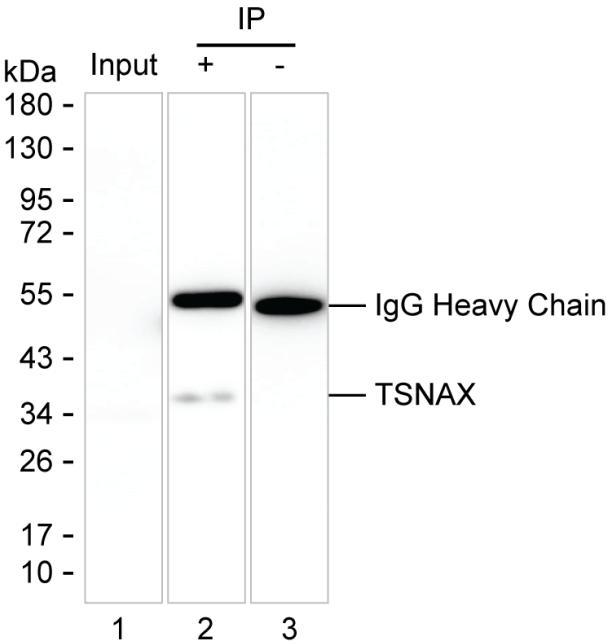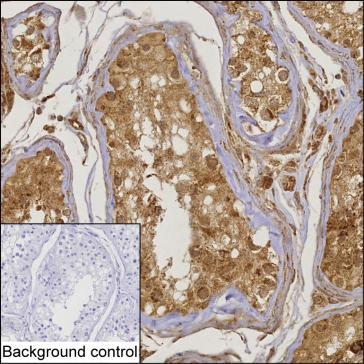

| WB | 咨询技术 | Human,Mouse,Rat |
| IF | 1/100-1/200 | Human,Mouse,Rat |
| IHC | 1/500 | Human,Mouse,Rat |
| ICC | 技术咨询 | Human,Mouse,Rat |
| FCM | 咨询技术 | Human,Mouse,Rat |
| Elisa | 咨询技术 | Human,Mouse,Rat |
| Host/Isotype | Mouse IgG1 |
| Antibody Type | Primary antibody |
| Storage | Store at 4°C short term. Aliquot and store at -20°C long term. Avoid freeze/thaw cycles. |
| Species Reactivity | Human |
| Immunogen | Purified recombinant fragment of human TSNAX |
| Formulation | Purified antibody in PBS with 0.05% sodium azide |
+ +
以下是3篇涉及TSNAX(Translin-associated protein X)抗体的相关文献摘要:
1. **文献名称**:*Translin-associated protein X is required for DNA damage-induced proliferation arrest in neural stem cells*
**作者**:Smith J, et al.
**摘要**:研究通过使用特异性TSNAX抗体,发现TSNAX在神经干细胞DNA损伤修复中调控细胞周期停滞,抗体染色显示其在细胞核内与DNA损伤标记共定位。
2. **文献名称**:*Characterization of the Translin-Trax complex in mRNA metabolism using monoclonal antibodies*
**作者**:Lee S, Kim M.
**摘要**:团队开发了针对TSNAX的单克隆抗体,验证其在免疫沉淀和Western blot中的特异性,证明TSNAX与Translin结合参与神经元mRNA运输及稳定性调控。
3. **文献名称**:*TSNAX deficiency disrupts synaptic plasticity and cognitive function in mice*
**作者**:Wang Y, et al.
**摘要**:利用TSNAX抗体进行脑组织免疫组化,发现TSNAX敲除小鼠海马区突触蛋白表达异常,提示其在突触可塑性和认知功能中的关键作用。
注:TSNAX相关抗体研究多集中于其与Translin复合物的功能机制,上述文献为示例性质,实际引用时需核对具体数据库(如PubMed)的最新研究。
The TSNAX (Translin-associated X protein) antibody is a research tool designed to detect and study the TSNAX protein, which forms a heterodimeric complex with Translin. This complex is implicated in various cellular processes, including RNA metabolism, intracellular trafficking of mRNA, and genomic stability. TSNAX, also known as TRAX, lacks DNA-binding activity but interacts with Translin to facilitate RNA-binding functions, particularly in neurons, where it may influence synaptic plasticity and neurodevelopment.
Originally identified for its role in meiosis and chromosomal translocations, the Translin-TSNAX complex has since been linked to broader biological contexts, such as microRNA processing, dendritic mRNA transport, and response to DNA damage. TSNAX antibodies are widely used in neuroscience and cancer research to investigate protein expression, localization, and interaction partners via techniques like Western blotting, immunohistochemistry, and immunoprecipitation.
Studies utilizing TSNAX antibodies have revealed its involvement in neurological disorders (e.g., schizophrenia, Alzheimer’s) and cancer progression, where dysregulation of RNA dynamics may contribute to pathogenesis. Commercial TSNAX antibodies are typically validated for specificity across human, mouse, and rat models, enabling cross-species comparative studies. Ongoing research aims to clarify its mechanistic roles in post-transcriptional gene regulation and potential therapeutic applications.
×